Meet Aseel Tayah: A Palestinian Artist, Mother and Activist

Aseel Tayah has been described as an unstoppable force. She is an award-winning artist, TEDx speaker, mother and activist–passionate about creating a world where arts and creativity abound and every child feels safe. We interviewed Aseel for Lunch Lady 25, Jan 2022.
Tell us about yourself.
I’m a mum, wife and artist and I am very passionate about social change. I live with my husband, Amil, and our daughter, Reema, who’s four, in northern Melbourne, but I am Palestinian born and raised.
What was your life like in Palestine?
I lived in a country in continuous war, and it was very hard, but I still lived with people I loved. So, it’s tricky to say whether it was good or not. I lived with my family between Jerusalem and Haifa and am the oldest of five children. I miss them so much; we haven’t seen each other for about two years because of Covid.
When did you come to Australia?
I immigrated to Australia in 2013, but my husband came a year before me. It sounds very simple when I say it like that, but it was, of course, one million times more complicated. There are so many small details to make these things happen.
What was it like to arrive in Australia from Palestine?
I didn’t know much about Australia and hardly spoke the language. At first, we lived in Western Australia, which doesn’t have many people like me. I’m a Hijabi and I’m an Arab. I didn’t see many people like me on that side of Australia, so it took a while to adjust and adapt. It was a bit tricky to feel welcome. WA has lovely beaches and spaces, but it was so different to where I came from.
Did anything surprise you?
The first thing that shocked me was learning about First Nations culture. I knew nothing of Australian history before coming here. But I was also surprised that many Australians know nothing about Palestine. I would say to people, “I am from Palestine.” And they would reply, “Pakistan?” And I would say, “No, I was born in Jerusalem.” And they would say, “Oh, Israel!” There is a big internal struggle when you exist in a country that doesn’t know about you, your people or your country.
Is food an important part of your family and culture?
We love food. Ever since Reema has been old enough to hold a whisk, we have cooked together.
As a Palestinian, food is also a form of resistance—we exist through small hidden things like a recipe or how we do things.
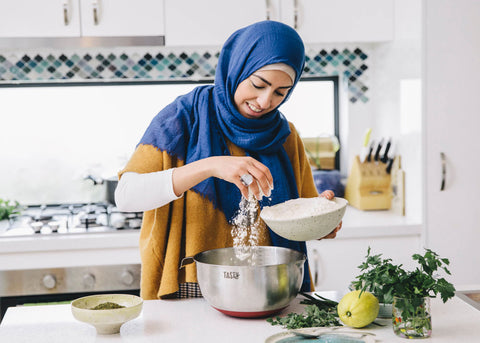
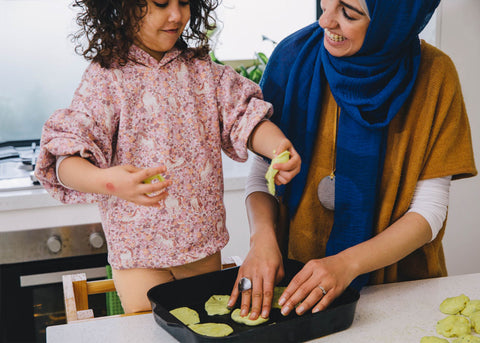
In Palestine, our people lived in the mountains and za’atar grows in the mountains. It’s an ingredient similar to thyme, but it is kind of spicy and brighter in colour. It grows everywhere like a wild herb, and it has a strong smell and taste. You can buy za’atar bread in Lebanese bakeries, but they add other spices too.
In Palestine, we just dry it and add sesame seeds. When I finally found za’atar growing in a friend’s garden, I cried because I hadn’t been able to find it in Australia. I now have some growing in my small garden.
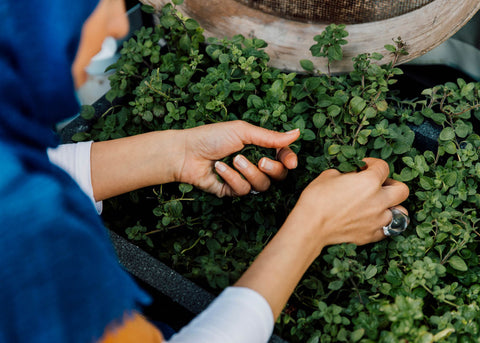
The other foods you will find in our culture are olives, olive oil and figs. Many of our olive trees were demolished and burned, but we try to keep that food alive, and it’s something we are proud of. And figs are my favourite food—I could swim in figs.
What was your experience of motherhood like?
As beautiful as it can be and as difficult. Raising Reema in Australia, away from my family, was very hard because I am a family person. But, it was also beautiful because I have friends who exist in my life that try to be like uncles and aunties to Reema, and that fills my heart with love.
When I was a child, I was raised by my mother and my aunties. At first, I lived in Jerusalem and my aunties were not my mother’s sisters. They were women who helped my mother exist without her own family around. These beautiful aunties taught me songs about resilience, the history of places and our identity through stories. We called them Hakawati: storyteller.
Later, we moved to my parents’ hometown, and I was raised between my mum’s friends and her actual sisters. They were a community of oral history advocates and researchers, artists and actors. And that’s where some of my art comes from. These aunties helped me become who I am today—I feel like a beautiful mix of them all, and they add much to my character because of their generosity, love and care.
Reema has some of that, but because Australia is big and things are far apart, she doesn’t get to see and meet and live with these people as often as I would like. Suffering from post-natal depression also took me away from people as I tried to deal with myself, my own way. I guess many migrants here live the same experience, and we have to build families away from home.
We make it work as we go. For now, I live surrounded by people who are also passionate about social change and who really change lives in the community. And I let Reema listen to those women, sit with their wisdom and breathe this culture into who she is. It’s my way to help her learn who to be like, without having to say it. I would like her to learn what life is from those aunties.
Did anything surprise you about becoming a mum?
Everything was a surprise. Before Reema was born, my parents came to visit, and I told my mother, “I don’t want to do it your way. I will give birth, and then I will go back to my job and my life in a few months.” Because I really loved the work I was doing with young people in prison. Ha! I couldn’t do that. I breastfed until Reema was three and realised my life had become raising this beautiful human being. My life was now about giving as much love and support as I could. And I learnt that I was more patient than I thought I could be. I became a new human who I loved more, who was more understanding and forgiving. I am grateful for that.
What role does community play in your life?
My friends say I would speak to the stones if they could talk back. I speak to everybody—I walk down the street and say hello to people all the time. I comment on people’s outfits and haircuts, I comment on the delicious food they are eating—even when we are in restaurants and no one wants you to look at their plate. It's nice to make people feel happy without being dishonest—I freely comment when I see something I love. I think a nice comment can change your day, and I like to put a smile on people’s faces. And I also do this because finding a nice person to talk to about motherhood or hardship has helped me get out of hard times before. A conversation always makes me feel good, so I decided to build a community everywhere I go.
My art, for example, tells stories of people I have met in the shops. One of my theatre shows is about the journey of a grocery person in my local shopping centre. Another show is about a Palestinian man who is ninety, and he left Palestine when he was twenty. I became friends with him, his sons, his grandson and his great-grandsons. They all came to the show to listen to his story. I love connecting with people.
Can you tell us about some of the projects you run in Jerusalem?
When I lived in Palestine, I did lots of voluntary work in orphanages, schools, hospitals and streets. And before I had Reema, I had a few miscarriages. They were very hard to accept, and I thought: If I didn’t even see this baby and I feel so much grief, what about the parents and children who have lost each other because they were killed? So, I decided to make something for orphans back home. I created a fundraising project called We Too Deserve to Live, and with the money raised, I organised a festival for orphans and children in the Aida refugee camp. I went back to run the festival for 500 children. Since then, I am constantly fundraising for many projects. One project is toy libraries. I started the very first toy library in Palestine—there are now seven in Gaza and two in the West Bank.
I run these projects because I feel very privileged in Australia. And I feel lucky to have playgrounds and open spaces to enjoy. Children at home don’t have that—it’s often not safe for them to play, and I feel a responsibility to my home and my people. I feel I must do something and worry it’s not enough. It’s important to tell their stories and say: I am Australian and I live and exist here, but these are my people and you need to hear their stories.
Can you share some of the artistic projects you’re currently working on in Australia?
I have a few projects at the moment, including a new show funded by the Australian Children’s Theatre Foundation called Ardna. It’s a children’s show I’ve developed with a First Nations producer named Jason Tamiru, and it’s about caring for the land.
There’s another show called Bukjeh: Stories of Home, and of Having to Leave it, about the journeys of refugees to Australia. Bukjeh was my first show and one of my favourites. And there is also Tahlila. ‘Tahlila’ is Arabic for lullabies under the stars, and it’s a show that encourages mums from different countries to celebrate their own language and learn First Nations language and culture. When children watch Tahlila, and I hear them go, “Wow!” it makes me so happy and fills my soul with love.
I’ve also just started a YouTube channel where Reema and I tell stories, make art and offer some education about different Arabic cultures living in Australia.
You’re a singer. Can you describe your singing style?
When I was young, I started singing to feel safe. I lived in an apartment building that had four different floors, 100 stairs and no lights. I used to sing to stop feeling scared of the dark when walking up the stairs.
Even today, wherever I am around the world, I will sing spontaneously when I walk on stairs. I try to sing a cappella because it’s more spontaneous and honest when it comes from the heart. I mostly sing stories of home, about mothers, resilience, land and feelings. They are songs about my identity, the way people are raised and the Arabic existence.
I actually wrote my master’s thesis about singing and lullabies and how they can help heal traumas for children and mothers. I feel singing is therapeutic in my life, and when I sing, it feels magical. At night, I don’t sleep without singing for my daughter, and she doesn’t sleep without me singing for her. Those songs are also an act of survival. My mother sang those songs to me, her grandmother to her, and her great-grandmother before her. Those songs are a treasure I keep so Reema can save them for later.
What inspires you?
Strong women inspire me. People with no fear in their hearts inspire me. I’m inspired by the beauty and survival of mothers in Jerusalem who say goodbye to their children each morning and don’t really know if they’re going to see them again. I’m inspired by the way my mum raised five children in a beautiful house that is now empty because her children live in different places across the world, but she still goes on and exists. I am inspired by small details, too—by plants that grow from seeds, even if I don’t feed them often. And refugees who start new lives in Australia every day after war and trauma. I make art from everything that lives and exists around me.
What are your hopes for the future?
I want a world without war, where children can have healthy childhoods, and everyone can feel safe. A world that is full of art and creativity, because that makes people happier.
What do you want people to know about refugees and immigrants?
That we didn’t choose to come here. I don’t know if that will make people feel happier or sadder, but no refugee ever chooses to leave their home. Refugees do not come to occupy another person’s country—they are running from a disaster in their own. And they love their homes and can’t wait to go back when time, culture and war allow it. There is nothing like the bakery in their hometowns and the music in their backyards. They don’t really like anywhere more than their own homes. They just aren’t fortunate enough to stay there.
///
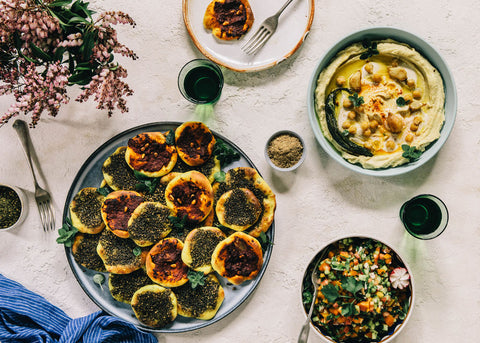
Aseel's Za’atar Bread Recipe
You'll need:
- 1 tbsp sugar
- 1 tbsp yeast
- 1 cup yoghurt
- 1/2 cup olive oil
- 2 cups water
- 4 cups flour
- salt
- 1 tbsp black seeds
- 1/2 cup fresh thyme
For the Za'atar Mix:
- 1 cup olive oil
- 1 cup za’atar (dried thyme and sesame seeds)
To Make the Za'atar Bread:
- In a bowl, add the sugar, yeast, yoghurt and olive oil and 1/2 cup of water. Set aside for 15 minutes.
- In another bowl, sift the flour, add the salt, black seeds and fresh thyme. Slowly add the dough mix and prepare your dough, adding the rest of the water 1/2 a cup at a time.
- Make small balls and flatten them to spread with za’atar mix.
- Bake in the oven on 200°C / 400°F / Gas Mark 6 until golden.
///
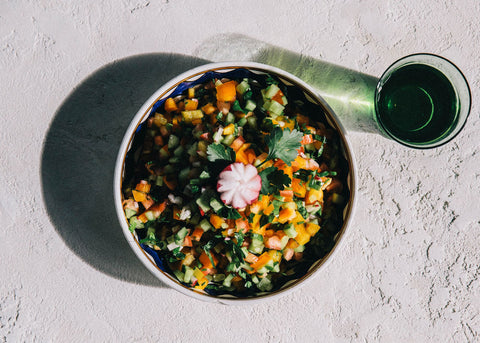
Aseel's Arabic Salad
You'll need:
- juice of 1 lemon
- 2 small radishes, chopped
- 2 cucumbers, cut into 1/2cm dice
- 4 tomatoes, deseeded and cut into 1/2cm dice
- 1 yellow capsicum
- 1 spring onion, cut into 1/2cm dice
- 1 green chilli, deseeded and finely diced
- 1/4 cup parsley, finely shredded
- 1/2 tsp salt
- 1/4 cup olive oil
To Make the Arabic Salad:
- In a bowl, mix all the vegetables and add salt, olive oil and lemon before serving.
///
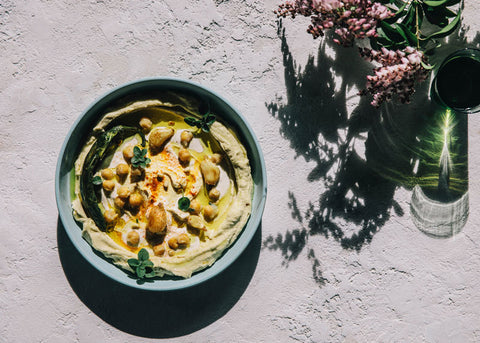
Mosabaha: Aseel's Triple Garlic Hummus
Serves 8 people
You'll need:
- 700g / 24.7oz cooked chickpeas
- 2 cups tahini
- 1 cup lemon juice
- 3/4 cup water
- 10 garlic cloves, crushed • bunch of parsley
- 1/3 tbsp roasted cumin seeds
- 1/3 cup cold water
- salt
- 1/3 olive oil
- 3/4 cup water
- sprinkle of paprika
To Make Mosabaha:
- First, cook the chickpeas on the stove until soft.
- To make the tahini sauce, combine 1 cup of tahini and 1/2 cup of lemon juice and mix them together. Then gradually add 3/4 cup of water and mix, making sure to keep it thick and smooth. Mix in 2 cloves of fresh garlic and salt and put mixture aside for plating.
- Combine 150g / 5.3oz of the cooked chickpeas, cut parsley and roasted cumin seeds and put aside for plating too.
- On the stove, smoke 4 garlic cloves, with skin on, until soft.
- Put the rest of the chickpeas in the food processor, and add the rest of the lemon juice (1/2 cup), 1 cup of tahini, the smoked garlic and some salt. Blend until smooth and gradually add the 1/3 cup of cold water.
- While the dip is blending, fry the remaining garlic in olive oil and get it ready.
- With a spoon, create a big circle with an edge (just like a shallow well) in the hummus, add a few spoons of the tahini sauce, and sprinkle the parsley mixture from step three, fried garlic and olive oil on top. Sprinkle with paprika.
///
Follow Aseel Tayah on Instagram or learn more about her work and creative projects.
Meet Aseel Tayah: A Palestinian Artist, Mother and Activist originally featured in Lunch Lady Magazine Issue 25. Photographs by Jacinta Moore.




